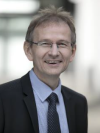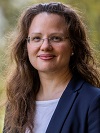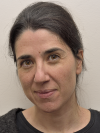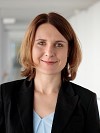
|
|
|
Keynote Speakers
Jan-E Bäckvall graduated from the Royal Institute of Technology, Stockholm in 1971. He received his Ph. D. from the same place in 1975. During 1975 – 1976 he spent one year as a postdoc with K. B. Sharpless at Massachusetts Institute of Technology. In 1976, he became Assistant Professor and in 1977 Associate Professor, both at the Royal Institute of Technology, Stockholm. In 1986, he moved to Uppsala University as a Full Professor. In 1997 he moved to his current position as Professor at Stockholm University. Prof. Bäckvall is a Member of the Royal Swedish Academy of Sciences, Finnish Academy of Science and Letters, and Academia Europaea. In 2008-2016 he was a member of the Nobel Committee for Chemistry. He is a member of a number of Editorial Boards for a number of scientific journals. He is renowned for his contribution to organopalladium chemistry and catalytic oxidation reactions where he has done mechanistic work and developed new reactions. He has also pioneered the development of efficient systems for dynamic kinetic resolution of alcohols and amines based on combined metal and enzyme catalysis. More recently the enantioselectivity of enzymes was improved by directed evolution. The Bäckvall group has also developed a variety of useful aerobic biomimetic oxidation reactions. In these reactions electron-transfer mediators are employed to facilitate low-energy electron transfer similar to that occurring in natural systems. Recent applications of the latter topic involve palladium-catalyzed oxidative carbocyclizations. His awards include the Arrhenius medal (1986), the Celsius Medal in Gold (2002), The “August-Wilhelm-von-Hofmann Lectureship Award” (2003), the Björkén Prize (2003), the Award for Excellent Research Environments from the Swedish Research Council (2003), the Ulla and Stig Holmquist’s Prize in Organic Chemistry (2005), ERC-Advanced Grant (2010), the George A. Olah Lectureship Award in Chemistry, University of Southern California, Los Angeles, USA, the Prelog Medal in Gold and Prelog Lecture, ETH, Zürich, Switzerland, and the Yamada-Koga Prize, Japan. He has published more than 520 papers and given more than 180 plenary and main lectures at international conferences.
Matthias Beller, born 1962 in Gudensberg, studied chemistry at the University of Göttingen, Germany, where he completed his PhD thesis in 1989 in the group of L.-F. Tietze. As recipient of a Liebig scholarship, he then spent a one-year with K. B. Sharpless at MIT, USA. From 1991 to 1995, Beller worked in industry. Then, he moved to the Technical University of München as Professor for Inorganic Chemistry. In 1998, he relocated to Rostock to head the Institute for Organic Catalysis, which became in 2006 the Leibniz-Institute for Catalysis. The work of his group has been published in >1000 original publications, reviews and >150 patent applications have been filed (H-index: 135).He has received a number of awards including the Otto-Roelen Medal and the Leibniz-Price of the DFG. In 2006, he was also awarded “Entrepreneur of the Year” of Rostock and he received the German Federal Cross of Merit. Since then, he received the first “European price for Sustainable Chemistry”, the “Paul-Rylander Award” of the Organic Reaction Catalysis Society of the USA, the Gay-Lussac-Alexander-von-Humboldt-Prize of the French Academy of Sciences and the Emil Fischer Medal of the German Chemical Society. In 2015, he was awarded an honorary doctoral degree from the University of Antwerp, Belgium and received the Wöhler price for Sustainable Chemistry from the German Chemical Society as well as an ERC Advanced grant from the European Commission. In March 2016, he received the honorary doctorate of the University of Rennes 1.In 2017, Matthias Beller has received the Karl Ziegler Prize from GDCh, (German Chemical Society) and the Karl Ziegler Foundation - the award is one of the highest honors in the field of chemistry in Germany – and he was awarded as the first European chemist with the ACS Catalysis Award Lectureship. Most recently, he was selected as the prestigious “Hassel Lecturer 2018” from the University of Oslo, Norway and for the “Gordon Stone Lectureship” of the University of Bristol, UK. Matthias Beller is Vice President of the Leibniz Society – one of the major science organizations in Germany and a member of the German National Academia of Science “Leopoldina” and three other Academies of Sciences.
Bas de Bruin studied chemistry at the University of Nijmegen from 1989-1994. He obtained his Ph. D. (April 20, 1999) from the same university (Rh Mediated Olefin Oxygenation). He did his postdoc in the group of Wieghardt at the Max-Planck Institut für Bioanorganische Chemie (Mülheim a/d Ruhr, Germany, April 1999-April 2000) for which he obtained an Alexander-von-Humboldt fellowship in 1999. After his postdoc he returned to the University of Nijmegen as an Assistant Professor in Inorganic Chemistry (Metal-Organic Chemistry), where he was involved in several research activities ranging from olefin oxygenation, radical organometallic chemistry, EPR spectroscopy, catalysis, DFT calculations, and (catalytic) synthesis of new polymeric materials. September 2005, Bas de Bruin obtained an NWO-VIDI grant to uncover new catalytic reactions. November 2005 he moved to the University of Amsterdam (UvA, group Reek, Homogeneous and Supramolecular Catalysis), where he was promoted to Associate Professor in 2008 and to Full Professor in 2013. Bas de Bruin presently focuses at the development of new tools in homogeneous catalysis, using metals in unconventional oxidation states and unconventional ligands, specifically aiming at the development of new catalytic reactions.
Carole Duboc received her PhD from the University of Grenoble in 1998 under the supervision of Professor Marc Fontecave and Doctor Stéphane Menage. Following postdoctoral position at the University of Minnesota, with Professor William Tolman, she joined the High Magnetic Field Laboratory at Grenoble in 2000 and the Department of Molecular Chemistry at Grenoble in 2007, where she is now CNRS senior researcher. Her research interests were always turned to two different scientific axis: the elucidation of the magnetic properties of metal complexes through an approach combining spectroscopic techniques and theoretical chemistry, and the design of bio-inspired complexes containing metal-sulfur bond(s) to develop structural and/or functional models of metalloenzymes. More specifically, the goals of her current projects concern the development of efficient systems for redox catalysis involving multi-electron reactions, with a special focus on complexes capable of reproducing certain vital reactivity of the living world with a major interest in the field of energy and environment. Several specific reactions or processes are targeted: selective reduction of oxygen in water or hydrogen peroxide, reduction of protons in hydrogen, and activation & valorization of CO2.
Giuliano Giambastiani received his Ph.D. in Chemistry from the University of Firenze (Italy) and the University Pierre et Marie Curie – Paris IV (France) in 1999, working on drugs total synthesis. After his post-doctoral fellows at the University of Lausanne, UNIL (Prof. C. Floriani) and the University di Milan (Prof. C. Scolastico), he joined in 2001 the ICCOM group (Institute of Chemistry of OrganoMetallic Compounds of the Italian National Research Council – ICCOM-CNR) where he currently holds the position of Research Director. In 2016 he was awarded from the Chinese Academy of Science with Lee Hsun Research Award on Materials Science in recognition of his contribution to material science and technology and in 2017 he was one of the recipients of the international call of the French presidency “Make our Planet Great Again” with a project for the development of catalysts and processes at the heart of renewable energy technology. Since that time, he is commuting his professional work between CNR and CNRS Strasbourg where he holds the position of Research Director at the ICPEES-University of Strasbourg. His current scientific activity spans from organic and organometallic synthesis and catalysis (homogeneous and heterogeneous) to the preparation and characterization of technologically advanced materials and composites based on functionalized carbon nanostructures such as carbon nanotubes, graphene, graphene-oxide and fullerenes. He is author of more than 150 scientific contributions (communications, full-papers, reviews) in peer-reviewed journals, 3 books, 7 book chapters and 14 patents (8 with international application - WO).
Kathrin H. Hopmann (Ph.D. 2008) is an Associate Professor in Computational Chemistry at UiT The Arctic University of Norway. Her research focuses on the mechanistic analysis and design of transition metal catalysts, especially for hydrogenation and carboxylation reactions. She is coordinator of the H2020- Innovative Training Network CO2PERATE and an Associate Editor at Organometallics. For more info and recent work see her ORCID profile.
Sami Lakhdar received his Ph.D. in 2006 from the University of Versailles and the University of Monastir under the supervision of Prof. François Terrier and Prof. Taoufik Boubaker. In 2007, he joined the group of Prof. Herbert Mayr at the Ludwig Maximilians University (LMU) (Germany) as an Alexander von Humboldt Postdoctoral Fellow, working on reaction mechanisms of organocatalyzed reactions. Since 2013, he is a CNRS Associate Researcher (2013-2019 (LCMT, Caen) and from 2020 he is a group leader at LHFA (Toulouse). His research interests focus on organic reactivity and visible-light-mediated carbon-heteroatom bond-forming reactions. Sami received the Jean-Pierre Sauvage award from the Organic Chemistry Division of the French Chemical Society (2019), the Thieme Chemistry journal award (2013), and the Römer award for postdoctoral research of the Dr. Klaus Römer Foundation (2011).
Ainara Nova is a permanent researcher at the Centre for Materials Science and Nanotechnology (SMN), at the University of Oslo, and Principal Investigator at the Hylleraas Centre for Quantum Molecular Sciences at the Department of Chemistry in the Universities of Oslo and Tromsø. She got her PhD at the University of Barcelona (Bellaterra, Spain) in 2008. After a first postdoc of 2 years in Montpellier (France), she went back to Spain for a second postdoc in ICIQ (Tarragona) until 2012, when she moved to Norway. During her career, Dr Nova has specialized in the computational study of reaction mechanisms with homogeneous catalysts, and more recently, with MOF-based heterogeneous catalysts. She has more than 50 publications (H-index 27) in collaboration with national and international experimental groups. The Research Council of Norway has granted Dr Nova two research projects: one for Young Talents in 2015, and one for Scientific Renewal in 2020, on CO2 hydrogenation reactions. Besides, she is currently leading the NordCO2 Nordic University Hub, and PI in the MSCA-ITN CO2PERATE, which gather experimental and computational groups working on CO2 conversion reactions.
Joanna Wencel-Delord was educated in chemistry at the Ecole Nationale Supérieure de Chimie de Rennes, France and she received her PhD in 2010 from the University of Rennes 1, France (Dr C. Crévisy and Dr M. Mauduit). After postdoctoral studies with Prof. F. Glorius at the Westfälische Wilhelms-Universität Münster (Germany) and temporary assistant professor position (ATER) at the University of Strasbourg (Prof. P. Compain), she joined CNRS in 2013 as an associate researcher in the group of Prof. F. Colobert (University of Strasbourg, France). Her research focuses on the transition metal-catalyzed asymmetric C–H activation, synthesis of axially chiral compounds and chemistry of hypervalent compounds. Her recent awards and distinctions include Bronze Medal of CNRS 2020, ERC-SG (2020), Guy Ourisson 2020 award attributed by Cercle Gutenberg, and Prize M. Julia for Emerging Talents, French Society of Chemistry, Organic Chemistry Division, (2018). She has published 55 articles and is the author of 2 patents. |
| Online user: 15 | Privacy |

|









